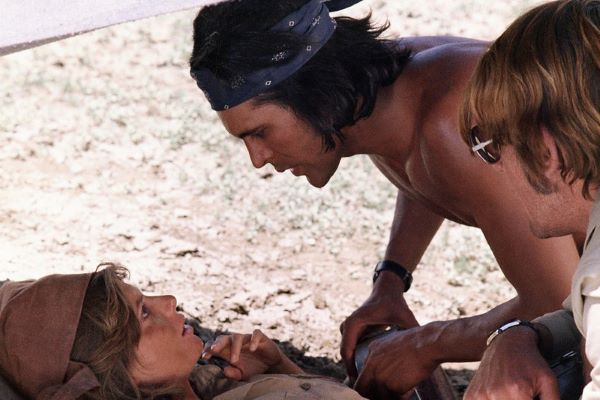This double feature of obscure ’70s horror movies focusing on indigenous North American affairs may be easy to write off on paper, but to do so would be to miss out on some surprisingly excellent genre thrills.
Creature feature Nightwing is by far the stronger of the two, and was clearly made in the wake of Jaws‘ monster success, with more than a nod to The Birds thrown in. On a reservation in New Mexico, something has been biting chunks out of the local livestock. This spate of attacks exacerbates existing tensions between Duran (Nick Mancuso) the Deputy of the Maski tribe to whom the land belongs, and Chee (Stephen Macht), the Westernised bureaucrat of the neighbouring Pahana Tribal Council. Enter the Van Helsing-like Payne (David Warner), a scientist who reveals that the culprits are a massive colony of vampire bats, and that humans are next on the menu. Not only this, the bats seem to have some kind of spiritual link to the old shaman (George Clutesi), who has begun to exhibit alarming suicidal behaviour.
If this sounds… well, batshit, then you would be correct. It’s also intelligently written by Martin Cruz Smith, adapting his own novel. The bats are interloping into an already volatile collision between tradition and modernity, magic and science that goes beyond mere scene setting. Clearly the lessons of Jaws have been learned, in that characterisation is as important as your beastie. And there is a lot going on here: Oil shale deposits, shady deals, apocalyptic visions, Christian missionaries. It’s ridiculously thematically deep given its unfair reputation as monster movie detritus.
The bat attacks themselves, although fairly laughable, are still filmed with the intention to terrify and therefore manage to avoid inadvertent camp (and be honest, Bruce the Shark always looked rubbish). They’re also surprisingly brutal in places, notably at the expense of the luckless missionaries. The rodents are imbued with the spirit of pure evil by the superbly eccentric Warner, who burns with a passion close to religious zeal for a man of science, and who gets most of the choice dialogue.
While clearly owing a debt to Jaws, and featuring a similar structure to The Birds, you can understand that it may have been sneakily influential in its own right in the creature features that came later, such as Arachnophobia and Pitch Black. A real gem among the mass of post-Jaws rip-offs.
Much less satisfying as a whole, but still possessed of its own crazy charm is Shadow of the Hawk. George McCowan’s film is more of a spiritual road movie, as old medicine man Hawk (Chief Dan George) persuades his unwilling, sceptical grandson Mike (Jan Michael Vincent) to help him fight a vengeful sorceress executed by Hawk’s tribe centuries before. Journalist Maureen (Marilyn Hasssett) comes along for the ride and provides moral support and a love interest, Mike learns to accept his familial and ancestral obligations.
As squarely divided into a three-act structure as a film is possible to be, Shadow of the Hawk is strongest in the middle section as the trio make their way to the reckoning with the sorceress. They are tracked by a mysterious, seemingly ghostly Dodge Charger, that appears and disappears randomly, and tries to ram them off the road. The sorceress also sends various animals after them, most notably a snake, and a bear, which Mike is forced to fight off with a penknife. The edits in this struggle are a particular delight, cutting between Vincent being cuddled by an obviously tame bear, and being swiped at by a man in a terrible bear suit. The section is also notable for the easy chemistry between the three leads, and the expansion of the mythology of Hawk’s shamanism.
The rest of the film doesn’t get beyond the merely passable, especially next to the genuinely good Nightwing. McCowan’s direction is workmanlike and the dialogue beyond Mike’s burdensome quest is just as utilitarian. Like Nightwing however, it is respectful to indigenous culture, and deals with similar themes like the uneasy relationship between tradition and modernity. But does seem like its inclusion is padding for the other similar but far superior tale.
This double bill as a whole is an odd release for Eureka, given their normal output of classics and modern world cinema. It feels more like the genre fare to which Arrow Video would put their name. Incongruity aside, Nightwing would be worth picking up on its own as an example of how satisfying a good creature feature can be.
Available on Blu-ray from Mon 15 Mar 2021
